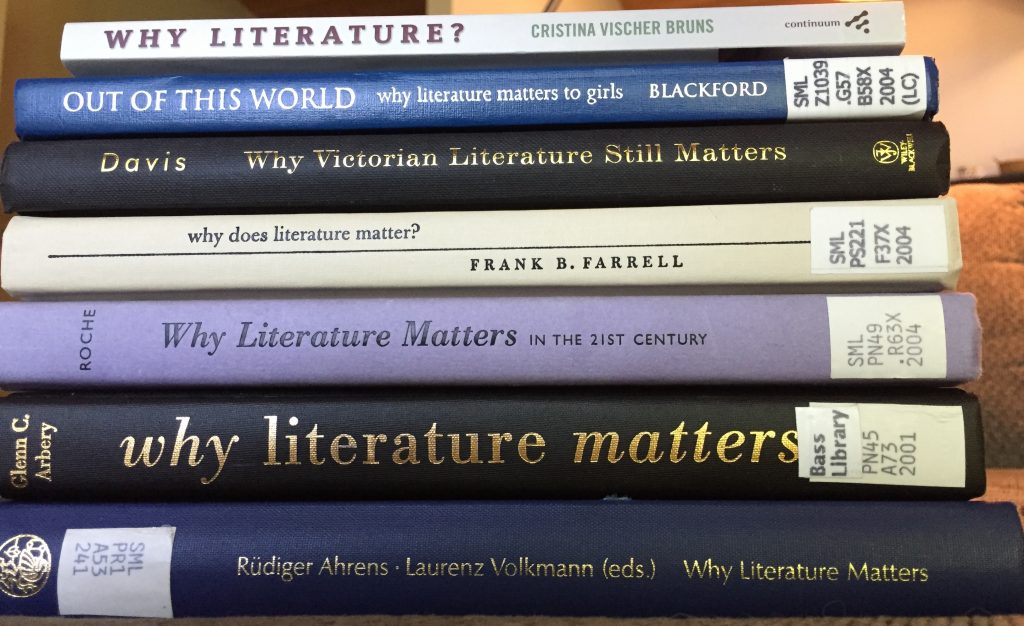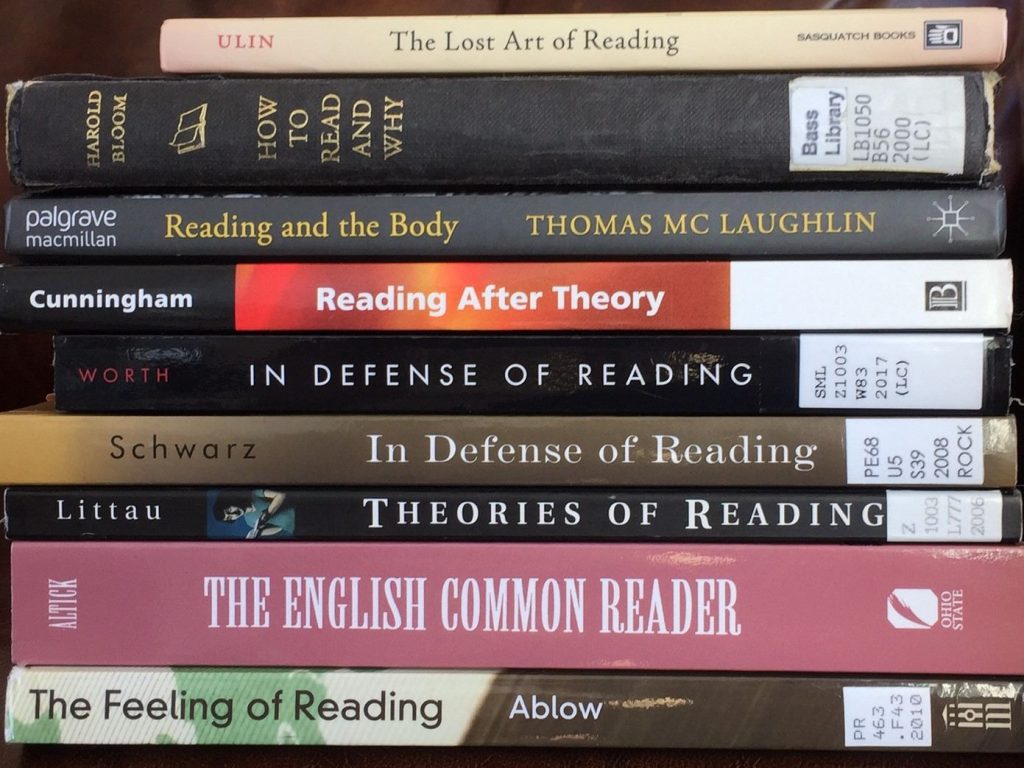Supplemental Bibliography
Archived content. The NEH Summer Seminar “Why Literature Matters”
occurred from June 24-July 21, 2018.
This list of secondary sources divides its items into two interrelated groups, those that contribute to the debate about why literature matters and those that deal primarily with the subject of reading:
- Why Literary Studies Matter
- Methods of Reading
There is, of course, overlap between these two categories. The most important of these sources will be available through Course Reserves at the McHenry Library.
Literary critical essays and books on the nineteenth-century writers whose work we are reading can be identified by doing searches in The International Bibliography of the Modern Language Association (at UCSC: http://cruzcat.ucsc.edu/record=b2948509~S5).
I. Why Literary Studies Matter
Why literature matters has recently become a topic of increasingly anxious debate. The number of critical and theoretical studies that have in their titles the words why, literature, and a form of the verb to matter attests to the extent and depth of that concern.

Appiah, Kwame Anthony. “Presidential Address 2017 – Boundaries of Culture.” PMLA 132.3 (May 2017): 513-525.
Arbery, Glenn C. Why Literature Matters: Permanence and the Politics of Reputation. ISI Books, 2001.
Blackford, Holly Virginia. Out of This World: Why Literature Matters to Girls. Teachers College, 2004.
Bruns, Christina Vischer. Why Literature? The Value of Literary Reading and What It Means for Teaching. Continuum, 2011.
Davis, Philip. The Experience of Reading. Routledge, 1992.
Denby, David. Lit Up: One Reporter. Three Schools. Twenty-four Books That Can Change Lives. Henry Holt, 2016.
Easterlin, Nancy. “The Functions of Literature and the Evolution of Extended Mind.” New Literary History 44.4 (2013): 661-682.
Felski, Rita. “Introduction.” Special issue: Use. New Literary History 44.4 (2013): v-xii.
Gilmore, William J. Reading Becomes a Necessity of Life: Material and Cultural Life in Rural New England, 1780-1835. University of Tennessee Press, 1989.
Harpham, Geoffrey Galt. “The Essential English Department: Textual Analysis is Crucial to Citizenship.” Chronicle of Higher Education (October 6, 2017): B6-B9.
Keen, Suzanne. Empathy and the Novel. Oxford University Press, 2007.
McDonald, Ronan, ed. The Values of Literary Studies: Critical Institutions, Scholarly Agendas. Cambridge University Press, 2015.
McGregor, Rafe. The Value of Literature. Rowman and Littlefield, 2016.
McGurl, Mark. “Ordinary Doom: Literary Studies in the Wasteland.” New Literary History 41.2 (2010): 329-349.
Meretoja, Hanna, Saija Isomaa, Pirjo Lyytikäinen, and Kristina Malmio, eds. Values of Literature. Brill Rodopi, 2015.
Nussbaum, Martha C. Not for Profit: Why Democracy Needs the Humanities. Princeton University Press, 2012.
Pasco, Allan H. “Literature as Historical Archive.” New Literary History 35.3 (2004): 373-394.
Shields, David. How Literature Saved My Life. Vintage, 2013.
Small, Helen. The Value of the Humanities. Oxford University Press, 2013.
Ulin, David L. The Lost Art of Reading: Why Books Matter in a Distracted Time. Sasquatch, 2010.
II. Methods of Reading
The practice of close reading, which has been dominant for almost one-hundred years, is being challenged by a series of alternatives: surface reading, “just reading,” hypher reading, and distance reading. In addition, some critics are advising that the symptomatic or the so-called paranoid reading characteristic of post-structuralist approaches should be replaced by ideals of reparative reading.

Ablow, Rachel. “Victorian Feeling and the Victorian Novel.” Literary Compass 4.1 (2007): 298-316.
Ablow, Rachel, ed. The Feeling of Reading: Affective Experience and Victorian Literature. University of Michigan Press, 2010.
Abrams, M. H. The Mirror and the Lamp: Romantic Theory and the Critical Tradition. 1953. Norton, 1958.
Altick, Richard D. The English Common Reader: A Social History of the Mass Reading Public, 1800-1900. 2nd ed. Ohio State University Press, 1998.
Anker, Elizabeth S., and Rita Felski, eds. From Critique and Postcritique. Duke University Press, 2017.
Augst, Thomas. The Clerk’s Tale: Young Men and Moral Life in Nineteenth-Century America. University of Chicago Press, 2003.
Best, Stephen. “La Foi Postcritique, on Second Thought.” PMLA 132.2 (2017): 337-343.
Bloom, Harold. How to Read and Why. Scribner, 2000.
Bringing Reading to Life. Kanopy Streaming, 2014.
Cavollo, Guglielmo, and Roger Chartier. History of Reading in the West. Trans. Lydia G Cochrane. Polity, 1999.
Chew, Daglish, and Julie Orlemanski. “We, Reading, Now.” Arcade: Literature, Humanities, and the World. Stanford University. http://arcade.stanford.edu/colloquies/we-reading-now
Cunningham, Valentine. Reading after Theory. Blackwell, 2002.
Felski, Rita. The Limits of Critique. 2015.
Flint, Kate. The Woman Reader, 1837-1914. Clarendon Press, 1993.
Friedman, Susan Stanford. “Both/And: Critique and Discovery in the Humanities.” PMLA 132.2 (2017): 344-351.
Fuss, Diana. “But What About Love?” PMLA 132.2 (2017): 352-355.
Hassan, Robert. The Age of Distraction: Reading, Writing, and Politics in a High-Speed Networked Economy. Transaction, 2012.
Hayles, N. Katherine. “Hyper and Deep Attention: The Generational Divide in Cognitive Modes.” Profession (2007): 187-199.
Hollywood, Amy. “Reading as Self-Annihilation.” Critical or Uncritical, Jane Gallop, ed. Taylor and Francis, 2004, 39-63.
Landow, George. Hypertext 3.0: Critical Theory and New Media in an Era of Globalization. Johns Hopkins University Press, 2006.
Latour, Bruno. “Why Has Critique Run out of Steam? From Matters of Fact to Matters of Concern.” Critical Inquiry 30.2 (Winter 2004): 225-248.
Leitch, Thomas. “Literature vs. Literacy.” Film Adaptations and Its Discontents. Johns Hopkins University Press, 2009, 1-21.
Lesjak, Carolyn. “Reading Dialectically.” Criticism 55.2 (Spring 2013): 233-277.
Levinson, Marjorie. “What is the New Formalism?” PMLA 122.2 (March 2007): 558-569.
Littau, Karin. Theories of Reading: Books, Bodies, and Bibliomania. Polity, 2006.
Love, Heather. “Close but not Deep: Literary Ethics and the Descriptive Turn.” New Literary History 41 (2010): 371-391.
Manolescu, Ion. “Hyper-Texts and Literature: A Reading Theory Approach.” Caietele Echinox 20 (2011): 71-78.
Marcus, Sharon, Stephen Best, and Heather Love. “Building a Better Description.” Representations 135 (2016): 1-21.
McLaughlin, Thomas. Reading and the Body: The Physical Practice of Reading. Palgrave Macmillan, 2015.
Mitchell, W. J. T. “The Commitment to Form; or, Still Crazy after All These Years.” PMLA 118.2 (2003): 321-325.
Moretti, Franco. “Style, Inc.: Reflections on Seven Thousand Titles (British Novels, 1740–1850).” Critical Inquiry 36.1 (Autumn 2009): 134-158.
National Endowment for the Arts. “Preface” and “Executive Summary.” To Read or Not to Read: A Question of National Consequence. 2007. 3-20.
Price, Leah. “Reading: The State of the Discipline.” Book History 7.1 (2004): 303-320.
Riener, Cedar, and Daniel Willingham. “The Myth of Learning Styles.” Change 42.5 (2010): 32-35.
Schwarz, Daniel R. In Defense of Reading: Teaching Literature in the Twenty-First Century. Wiley-Blackwell, 2008.
Silverman, Gillian. Bodies and Books: Reading and the Fantasy of Communication in Nineteenth-Century America. University of Pennsylvania Press, 2012.
Stallybrass, Peter. “Books and Scrolls: Navigating the Bible.” Books and Readers in Early Modern England, ed. Jennifer Anderson and Elizabeth Sauer. University of Pennsylvania Press, 2001, 42-79.
Sumara, Dennis J. Private Reading in Public: Schooling the Literary Imagination. Peter Lang, 1996.
Theile, Verena, and Linda Tredennick, eds. New Formalisms and Literary Theory. Palgrave Macmillan, 2013.
Uhlmann, Anthony, Helen Groth, Paul Sheehan, and Stephen McLaren. Literature and Sensation. Cambridge Scholars, 2009.
Worth, Sarah E. In Defense of Reading. Rowman and Littlefield, 2017.
Zboray, Ronald J. A Fictive People: Antebellum Economic Development and the American Reading Public. Oxford University Press, 1993.
